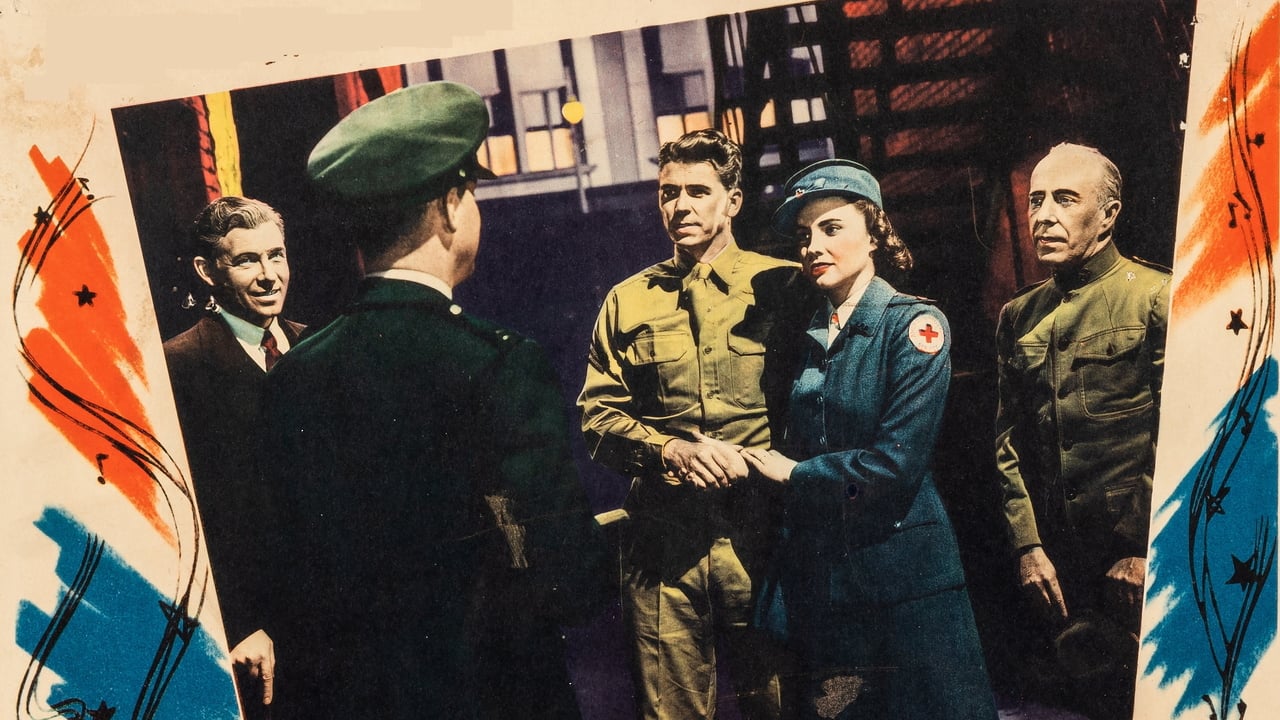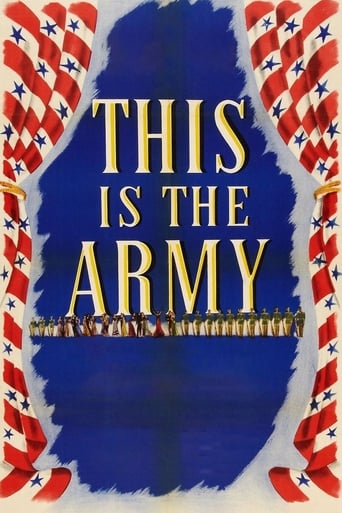

Best movie ever!
... View MoreThe movie's neither hopeful in contrived ways, nor hopeless in different contrived ways. Somehow it manages to be wonderful
... View MoreA film of deceptively outspoken contemporary relevance, this is cinema at its most alert, alarming and alive.
... View MoreOne of the worst ways to make a cult movie is to set out to make a cult movie.
... View MoreAs a musical This is the Army is average at best. As a slice of American History, of a time when so many entertainers put aside personal profit to entertain troops, this film is special. Also it is a reminder that Michael Curtiz, not usually ranked among the great directors is none the less one of the most versatile director ever. Coming off of Yankee Doodle Dandy, this is another flag waving musical, and if he isn't lucky enough to have a star of the level of James Cagney, this ensemble review is more reflective of the wartime review show. The numbers are well staged, with many fine solo performances highlighted. Particularly outstanding is the performance by Kate Smith of God Bless America, interspersed with shots of families about to be affected by the war listening intently. It really does give of sense of what it was like in 1942, wondering where sons and husbands would be going soon. But in the end nothing about that matters. This film is worth watching just to see Irving Berlin reprise his role in Yip Yip Yaphank, performing "I Hate to Get Up In The Morning". (Berlin, a chronic insomniac, really did hate getting up in the morning). In addition to the historic value of this piece of film, there is also some satisfaction in seeing one of the true geniuses of the American Musical Theatre, just managing to carry the tune of one of his own songs. It is a tribute to his commitment to the country and the war that he is willing to put himself front and center in this way. I own a DVD purchased in the wild and wooly days of copyright laoses, bought specifically for the purpose of owning this ;little slice of history. Sometimes I put it in and just waatch that part. There are better films of Irving Berlin's music, but none tht feature the man himself.
... View MoreThis is the type of musical that Hollywood did best and it sure was popular with the public. However, 65 years later, the film has lost much of its appeal due to changes in movie styles as well as the fact that the film's value as a propaganda tool is now lost--after all, the war has been over since 1945. So what was rousing and exciting then to the folks at home now just seems rather dated and slow--though the film still does have very good production values.The film is basically a bazillion patriotic songs rolled up into the thinnest of plots. Frankly, I think the film could have been a lot better had the story received greater emphasis and they'd dropped a few musical numbers. This would have given the film a much needed infusion of energy--though again, back during the war years, this wasn't as big a concern.The story, such as it is, begins during WWI. A group of soldiers (George Murphy, Alan Hale, George Tobias and Charles Butterworth and others) are interested in performing a musical to raise morale and the when they are given permission, the show is a huge hit. Many years later, when WWII arrives, the children of these same men and others put on their new and timely stage show. It's a major success and the soldiers are sent on a tour of the USA to increase the public's patriotism and backing of the war. There's a little more to the plot than this--but not much.As I said, it's really just an excuse to string together tons of musical and dance numbers--so many that you feel a bit overwhelmed. Some of the numbers are very good, the one with Irving Berlin was interesting (not good--just interesting from a historical sense) and a few were rather bad. The worst was the one that was a minstrel show--something that you'd hoped would have died out by 1943. It was just embarrassing and makes you cringe. Also, in a few separate parts of the film, Joe Lewis made some irrelevant appearances, as he couldn't sing and was as light on his dancing feet as a rhino! He just looked very lost but you can't blame him--he was ordered to appear in the film and since he was a sergeant, he had no choice! If I could, I'd give the film a score for 1943 (8) and one for today (4 or 5). But, since I can't, I'll give it a 6. Interesting from a historical standpoint but pretty tough going at times, though some of the songs were catchy and the color cinematography was lovely.As a history teacher, I was a bit concerned with a couple reviews that gave the film a 1. It wasn't nearly that bad and some of the reasons they gave it such a low score seemed petty. One was a diatribe about why they hated Ronald Reagan and really didn't review the film itself. Another was very critical about how the film was propaganda. My answer to that is YES it is propaganda and so what?! Given that it was a life and death struggle for survival in WWII only a knucklehead would see this sort of propaganda as an evil! Should Hollywood have either ignored the war or done pro-Hitler films instead?! Read your history books or talk to some vets before you make such silly assertions.
... View MoreThe musical "This Is The Army" qualifies as the most unusual war film that Warner Brothers produced. This Home Front musical stirred up controversy with scenes where active duty armed forces personnel cavorted in female apparel. Essentially, two Irvin Berlin stage plays, "Yip, Yip, Yaphank," a 1917 stage production, and Berlin's successful 1942 Broadway play "This Is The Army," served as the basis for the film. "Casablanca" scenarist Casey Robinson and veteran screenwriter Claude Binyon, an army captain now, added a back stage story about a young soldier's reluctance to marry his sweetheart before he marches off to war. The movie also spelled out its patriotic, gung-ho ideology in the last scene with the song "This Time Is The Last Time." The lyrics of this song suggested that there would not be a World War III. Warner Brothers assigned Casablanca director Michael Curtiz to "This Is The Army." Production on this Technicolor "A" picture got underway February 24, 1943 and ended May 14, 1943.The action unfolds in New York City in 1917 as dancer Jerry Jones (George Murphy) receives his draft notice. Jones marries his sweetheart Ethel (Rosemary DeCamp) and then reports for duty. At boot camp, Jerry struggles to make the transition from dancer to foot soldier. He makes his drill instructor, Sergeant McGee (Alan Hale, Sr.), painfully aware of his problem with regimentation. When Sergeant McGee talks about Jerry's problem to the camp commandant, Major John B. Davidson (Stanley Ridges), the commander decides that Jerry's talents may be put to better use on a morale boosting play. Jerry produces and stages "Yip, Yip, Yaphank," a show about Army life. As the show draws to a finish, the doughboys march off the stage in full fighting gear, down the aisles, and head for their transport ship. Jerry sees action somewhere in France, and comes home a cripple. He walks with a slight limp, but his handicap does not restrict him from his first lovethe stage. He opens a theatrical talent agency.The film leaps from 1918 to 1941, and Jerry's son, Johnny (Ronald Reagan), enlists in the Army to fight World War II. Johnny's sweetheart Eileen Dibble (Joan Leslie) wants to marry him before he leaves, but he refuses to exchange vows. Meanwhile, Jerry gets together with Major Davidson, and they arrange for Jerry to produce another morale boosting musical. Reluctantly, Johnny helps out his father. Unlike "Yip, Yip, Yaphank," the new show incorporates African-Americans in the cast, most prominently boxing champion Sergeant Joe Louis (the actual Joe Lewis), and features an all black musical number "That's What The Well-Dressed Man in Harlem" will weararmy khakis. As the soldiers are about to perform their final number, Ethel persuades Johnny to marry her. In the closing number, Johnny and the troops march off to World War II singing "This Time Is The Last Time." No sooner had Warner Brothers prepared to go into production on "This Is The Army" than an issue arose involving overseas distribution and the Office of Censorship. Warner sent a memo to Hal Wallis about the matter dated December 28, 1942, that Allison Durland, an unofficial adviser to the OOC who handled Latin American affairs for the PCA, said, "regardless of extenuating circumstances he does not believe export license would be granted because of female impersonators." As Warner Brothers would learn to their surprise, Central and Latin American countries considered men dressing up as women as repugnant and immoral. That American soldiers would be impersonating females did not go over well either.Although Warner Brothers released This Is The Army to domestic theaters on August 14, 1943, the studio had to confront the unexpected crisis over female impersonators, a predicament unique to this movie, because they produced no other films during the war that created so much controversy over something that everybody involved in deemed more amusing than offensive. Warner Brothers foreign distribution executive Carl Schaefer sent a memo to Warner on December 17, 1943, after he had conferred with Rothacker. Schaefer told Warner that he had "been advised unofficially we will be denied export license for This Is The Army if men play chorus girls as in the stage production." At length, Schaefer explained the rationale to Warner, "Female impersonators do not exist in Latin America: men in women's clothing are highly insulting and revolting to Latin American sensibilities and censors. Even could the film be exported, United States soldiers cavorting in dresses would represent ammunition to the enemy's propagandists. The Universal Pictures film "Argentina Nights" (1940) proved this point."This Is The Army" is a blast to watch.
... View MoreWhile combining through my local big retail store, I found in the dollar bin an old movie made in 1943. What intrigued me about this film was that it had one of our country's greatest political figures in it. I have always been a fan of Ronald Reagan even though I fancy myself a Democrat. I had always wished to gaze upon him in his prime as an actor, and never been granted the means to do so until this point. Imagine my dismay when returned home to find that my favorite political figure does Black Face in this film, which in my opinion is one of the most insensitive things anyone could do. I know and understand the film was made at a time when this was allowed and respectable commonplace. I also know that things like this should be watched so we can better understand where our nation came from, and that it has not been all that long since the world mistreated blacks. I just don't know how this film was overlooked when Reagan ran for the presidency or even for Governor of California. I believe everyone should watch this and learn that even though this man lead us through the greatest decade of all time, in the past he was a bigot, and that his legacy still continues today with the son of Reagan's vice president now our president. It makes you wonder what false race lies were shoved down Mister Bush Jr. throat before he made to being our national leader. Watch this film to see our past.
... View More